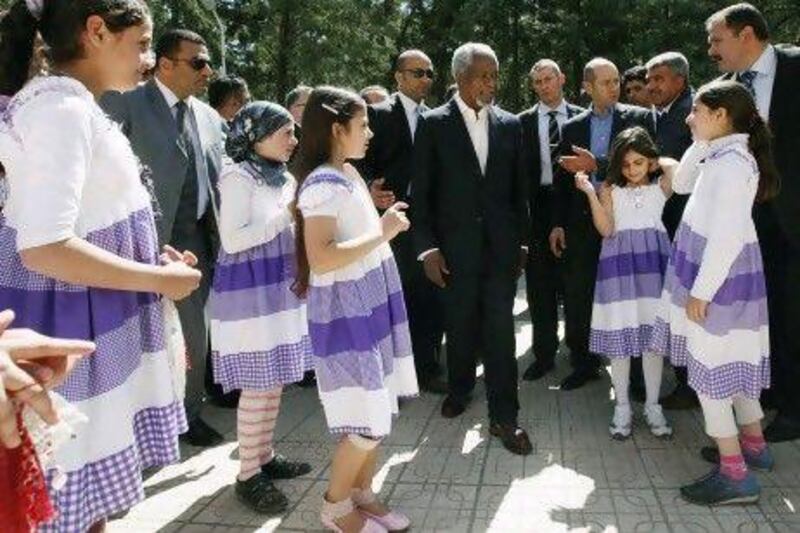ISTANBUL // International mediator Kofi Annan yesterday conceded his peace plan for Syria had run into difficulties with violations of a deadline for a withdrawal of government troops, but said there was still a chance to end the fighting this week.
However, Mr Annan seemed to have failed to convince Turkey, Syria's biggest neighbour, whose government accused Damascus of continuing a bloody repression of the opposition.
"We still have time until the 12th of April to stop the violence", Mr Annan said during a televised news conference after a visit in a camp for Syrian refugees in southern Turkey. He was referring to a provision in his plan that calls for an end of all hostilities by tomorrow.
Mr Annan conceded that "at the moment, the peace plan is not implemented according to our timetable". He said the Syrian government had told him it had started to withdraw its troops in several areas, but added there were other troop movements that were not in line with Syria's commitments. "There should be no preconditions for stopping violence," Mr Annan said.
The recent increase in the number of Syrian refugees in Turkey was evidence that the situation in Syria remained difficult, Mr Annan said. "Something is going wrong," he said, adding he would inform the UN Security Council later in the day. Mr Annan was due to travel to Iran last night.
"The plan is very much alive," Mr Annan said about his six-point-agenda designed to end the violence in Syria. Critics of the plan would have to explain "what you want to replace it with".
Mr Annan's comments stood in stark contrast to the view of his Turkish hosts. "According to our observation, the Syrian government has not implemented its promises," Basir Atalay, a deputy prime minister of Turkey, said, sitting next to Mr Annan. "The violence is continuing, especially in the regions of Aleppo, Idlib and Homs." He said 130 people had died in Syria on Monday.
Burhan Ghalioun, leader of the Syrian National Council (SNC), an opposition umbrella group, said the Syrian government was trying to use Mr Annan's plan "as a licence to kill". In a statement released in Istanbul, he called on Damascus to immediately observe a ceasefire.
In Hatay, Mr Annan met Syrian refugees who found shelter in Turkey after fleeing the unrest in their home country. The camp is one of half a dozen in southern Turkey, housing about 25,000 refugees from Syria in total.
Before arriving in Yayladag, Mr Annan used a Turkish military helicopter for an aerial inspection of the refugee camp in Kilis, 150 kilometres to the north-east, where shots fired from the Syrian side wounded two refugees and two Turks on Monday, an incident that sent Turkish-Syrian tensions to new heights.
Recep Tayyip Erdogan, the Turkish prime minister, yesterday called Monday's shooting in Kilis a "clear border violation", which would not go unanswered. He said Syrian forces were "shooting fleeing refugees from behind".
Mr Erdogan's government also rejected accusations by Syria that it was arming rebels. "Turkey is not sending any armed elements to its neighbours, including Syria," a Turkish official told The National.
The prime minister's office in Ankara said Mr Erdogan was due to travel to Saudi-Arabia, one of the Arab states campaigning for a Turkish-Arab intervention in Syria, tomorrow.
Ahmet Davutoglu, Mr Erdogan's foreign minister, who accompanied the prime minister to China, cut short his visit yesterday to return to Turkey. He held separate talks with Mr Annan and with his British and French counterparts, William Hague and Alain Juppe.
Turkey has said repeatedly that it does not believe that the Al Assad regime will fulfil its commitments under the Annan plan. Mr Erdogan has said Turkey would "implement steps" once yesterday's deadline for a troop withdrawal had passed.
In his remarks yesterday, Mr Erdogan would not be drawn on whether Turkey would create a buffer zone on Syrian territory, but he said his government expected the number of Syrian refugees in Turkey to rise to 100,000 or even higher. He said many refugees saw Turkey as a "saviour", adding that Turkey's borders would remain open for fleeing Syrians.
"You cannot close the door on these people," Mr Erdogan said. "Once you close the doors, these people are toast." The prime minister said he was planning a visit of the refugee camps.
Several Arab states and members of the Syrian opposition have been calling for a buffer zone, arguing such a safe haven would offer protection for civilians as well as for soldiers defecting from the Syrian military, thereby speeding up a collapse of the regime in Damascus.
Given the differences between members of the UN Security Council, a mandate by the top world body for an intervention would be unlikely, but Turkey has been looking into other legal possibilities, according to news reports.
A pro-government Turkish newspaper reported yesterday Ankara was drawing on a 1998 agreement with Syria to legitimise a possible intervention in Syria. The agreement contained a pledge by Syria not to undermine Turkey's security, the Today's Zaman newspaper reported. There was no official confirmation.
tseibert@thenational.ae





